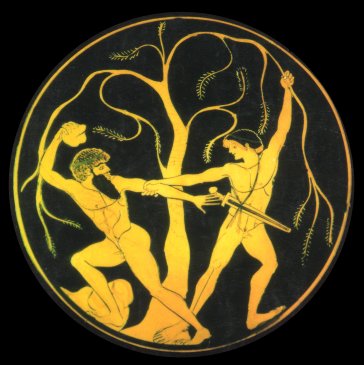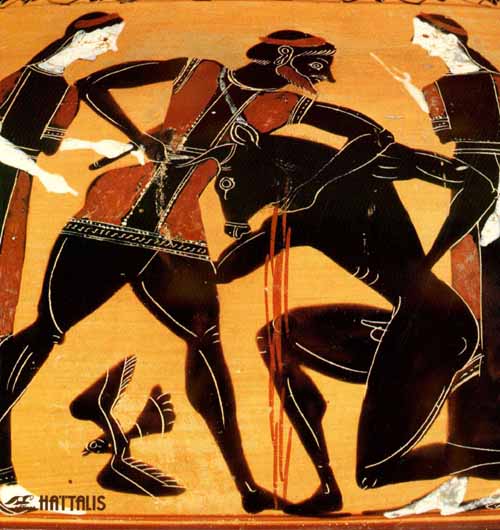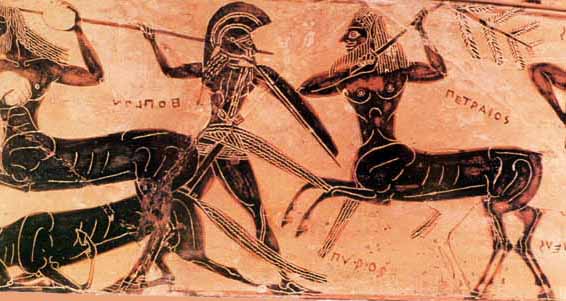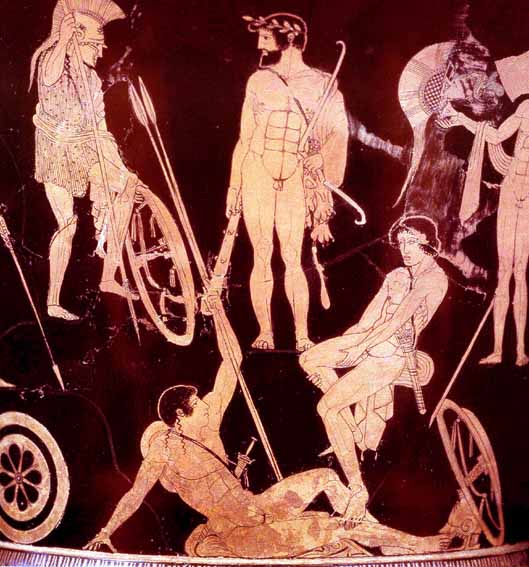Theseus
Theseus, or Θησεύς, was the greatest hero from Athens. In many aspects he was like his more famous cousin Heracles, strong and extremely brave. Yet his courage and strength were matched with wisdom and compassion.

Early Adventures
Early Life
Many say that Aegeus (Αἰγεύς), king of Athens, was his father. Yet, just as many think of him as the son of Poseidon.
Aegeus went to Delphi, wanting a son. Not understanding the oracle, he went to Troezen and visited Pittheus (Πιτθεύς), son of Pelops. However, Pittheus understood the oracle. After getting Aegeus drunk, Pittheus had his daughter sleep with Aegeus, but instead it was Poseidon who slept Aethra (Αἴθρα). If that's the case, then Theseus was not even an Athenian. Before Aegeus returned to Athens, he placed his sword and sandals under a huge rock, and told Aethra to send their son to him if he could retrieve the items from beneath the rock.
When he grew into a young man, Theseus removed the sword and sandals from under the rock. He walked to Athens instead of taking a ship. But bandits beset the road to Athens. Undaunted, Theseus faced each danger with quick thinking as much as strength and bravery.
His methods of dealing with the bandits were simple but effective: what the bandit did to his victim, Theseus did to the bandit.
A bandit known as Periphetes had the habit of bashing his victim's head. Theseus disarmed him and killed him with same club Periphetes had used on many of his victims.
Sciron forced his victim to wash his feet before he kicked them off the cliff. When Sciron tried to kick Theseus, the hero cleverly had Sciron thrown off the cliff instead.
As Theseus journeyed through the Isthmus of Corinth, he encountered Sinis, son of Polypemon and Sylea, daughter of Corinthus. This bandit was known as the Pine-bender because he had the habit of fastening his victim's legs to two pine trees bent down to the ground, before releasing the trees. Sinis died the same way as many of his victims had.
Sinis had a beautiful daughter named Perigune, who hid in a bed of rushes and asparagus when her father was killed. She prayed that she would never destroy these types of plant if they kept her hidden. Theseus could not find her, but Perigune came out anyway when Theseus promised not to harm her. Theseus took her to bed, and she bore a son named Melanippus. She and her descendants kept her promise. Melanippus was the same person who won the footrace at the Nemean Games, held by the Epigoni.
Theseus also killed the Crommyonian Sow, offspring of the monsters Echidna and Typhon, which was ravaging the countryside. Theseus wrestled and killed Cercyon at Eleusis, using his skill more than brute strength.
A bandit Procrustes had a bed that he would offer to his guest. If his victim were too short, he would stretch them with weights; if they were too tall, he would cut them until they fit the bed. He was killed in the same manner (which way Procrustes died, I'm not sure).
Finally Theseus arrived in Athens. However, Aegeus had married Medea, the sorceress who fled Corinth after killing Jason's betrothed and her father. Aegeus finally managed to have a son of his own. Medea bore Aegeus a son named Medus. Hearing of Theseus' fame, Aegeus invited the hero to a banquet, unaware that the young hero was his son.
Medea knew who Theseus was, and convinced the king to have the young hero poisoned. But before Theseus drank the poisoned wine, Aegeus recognised the sword his son wore at his side, instantly knocking the wine from his son's hand. Medea escaped and fled back to Colchis. Aegeus had Theseus named heir to the throne of Athens.
Aegeus had suffered from rebellion since he began his rule, after driving out the sons of Metions with the help of his brothers, Pallas and Lycus. Pallas had fifty sons known as the Pallantids. With the help of his son, Aegeus drove out his brother Lycus to Lycia, in Asia Minor. In the fighting, Theseus killed Pallas and his sons.
Related Information
Name
Theseus, Θησεύς.
Sources
Parallel Lives on Theseus was written by Plutarch.
Library and the Epitome were written by Apollodorus.
Metamorphoses was written by Ovid.
The Odyssey was written by Homer.
Fabulae was written by Hyginus.
Description of Greece was written by Pausanias.
Related Articles
Aegeus, Medea, Heracles, Lycus, Poseidon.
Crommyonian Sow.
House of Athens (genealogy)
Minotaur
Theseus soon learned that Athens had previously lost a war against Minos, king of Crete, son of Zeus and Europa. Minos had lost a son named Androgeus when Aegeus sent the youth to kill a bull. Instead, the bull killed Androgeus. Some would say that Aegeus deliberately sent Androgeus to his death.
To punish Aegeus and Athens, Minos demanded a tribute every nine years in which Athens would have seven youths and seven maidens to be delivered to his palace in Cnossus. There, they were thrown into the Labyrinth, a large maze where anyone would be lost as they walked along the twisting path, without ever finding the exit. The Athenian youths and maidens were to be food for a monster that lived in the Labyrinth.
The monster was known as the Minotaur (Μινώταυρος). The Minotaur was a creature with the head of a bull and the body of a man. The Minotaur was the offspring of Minos' wife Pasiphaë (Pasiphae), daughter of Helius, and a beautiful white bull known as the Cretan Bull.
When Minos first ruled Crete, he had prayed to Poseidon to send him a bull so he could sacrifice that bull to the Lord of the Sea. When the bull appeared, Minos could not bring himself to sacrifice the bull. Instead, he kept the bull.
Angry at the broken promise, Poseidon made Pasiphaë fall in love with the bull. Pasiphaë coupled with the bull. Instead of killing the monster that his wife had given birth to, Minos had his renowned inventor, Daedalus, build the Labyrinth and confined the Minotaur within the maze.
Theseus decided to end the tributes by killing the monster, going as one of the sacrificial victims. He promised his father that if were to succeed in this quest, he would change the black sail to a white one on his ship. Theseus had embarked on the greatest adventure of his heroic career.
Arriving in Cnossus, the victims were paraded along the street. Minos' daughter Ariadne (Ἀριάδνη), who watched the procession, instantly fell in love with Theseus. She sought out Daedalus and asked for a means of escaping the Labyrinth.
Ariadne then met Theseus, asking him to take her to Athens and marry her, if she helped him to find the exit. Theseus agreed. She gave him a ball of thread, and told him to tie one end of the wool to the entrance, unwinding the wool as he walked. If he wanted to leave the Labyrinth, then he could easily retrace his steps by following the thread.
Theseus boldly went looking for the Minotaur in the Labyrinth. Without a weapon, Theseus bashed the Minotaur to death with his fists as he pinned the monster down on the ground. With the thread, Theseus and the other sacrificial victims left the Labyrinth and escaped with Ariadne to the ship, setting their course for Athens.
Abandonment of Ariadne
There are many versions of why Ariadne never reached Athens. One was that Theseus deliberately abandoned her on the island of Naxos. Ariadne was found by Dionysus, the god of wine. The wine god comforted her and later married her.
Another was that Ariadne needed to recover from seasickness; she was left on the island while Theseus had to do some necessary work on the ship. A storm however kept the ship away from the harbour for many days. When Theseus returned to the island, Ariadne had died.
Still another version (in the Odyssey) says that Ariadne was killed by Artemis on the island of Dia, because of what Dionysus said against Ariadne.
Death of Aegeus
Upon Theseus' return to Athens, he forgot to change his sail from black to white. Theseus had agreed with his father that the white sail would mean that the hero was successful in his adventure, while the black sail indicated he had died in Crete.
Aegeus, seeing the black sail, thought his son had died. In his grief, Aegeus threw himself into the sea and drowned. The sea was named the Aegean Sea, after the king.
Because of his victory over slaying the Minotaur, it was said that Theseus established a festival in honour of Apollo called Pyanopsia, by suspending a hodgepodge of pulse and a branch of olive or laurel on the gate of the temple of Apollo.
Related Information
Sources
Parallel Lives on Theseus was written by Plutarch.
Library and the Epitome were written by Apollodorus.
Metamorphoses was written by Ovid.
The Odyssey was written by Homer.
Theogony was written by Hesiod.
Catalogues of Women was possibly written by Hesiod.
Poetica Astronomica was written by Hyginus.
Description of Greece was written by Pausanias.
Amazons
Theseus became king of Athens. He proved to be a wise and just king. As a king he tried to help those who could not protect themselves. Theseus protected the exiled and aged Oedipus and his daughters at Colonus from men sent by Creon, regent of Thebes and Oedipus' uncle. Theseus comforted the aged king until he died. At his death, Theseus escorted Oedipus' daughter safely back to Thebes.
Similarly, after the disastrous conflict of the Seven Against Thebes, Creon, regent of Thebes, refused to allow the Argives to bury the fallen leaders. Adrastus, the only surviving leader of the ill-fated expedition, appealed to Theseus for aid.
Theseus and his Athenian army defeated the Thebans, then forced Creon to give up the Argive dead and allow them to be buried. Even though Theseus was a victor, he did not allow the Athenians to occupy or loot Thebes.
See Seven Against Thebes.
According to Eurpides' tragedy, The Madness of Heracles, Theseus persuaded his cousin Heracles not to commit suicide. Heracles, because of his madness - a madness inflicted by Hera - murdered his sons and possibly his wife Megara.
Where Heracles' other friends fled from him, Theseus tried to comfort him and roused Heracles' courage, telling him only a coward would kill himself. Theseus took Heracles to Athens to purify his cousin.
In other versions, Theseus was not involved in this myth with Heracles. Most sources claim that it was Thespius who purified Heracles. Whoever purified him, Heracles still ended up going to consult with the oracle of Delphi, and performed twelve labours for his cousin Eurystheus.
Though he had great responsibility as a king, it did not restrain Theseus' love for adventure and danger. In Marathon, there was a bull known as the Marathonian Bull, killing people and ravaging crops. It was formerly known as the Cretan Bull, which King Minos had owned. This same Cretan Bull was the father of the monster, the Minotaur. This Cretan Bull was brought from Crete to Tiryns by Heracles, in one his twelve labours. After Heracles showed this bull to Eurystheus, he released it. The bull eventually arrived in Marathon.
Theseus also went to Marathon and killed the Marathonian Bull, as he did its offspring.
The following events about Theseus and the Amazons are rather confusing, depending on what sources you rely on.
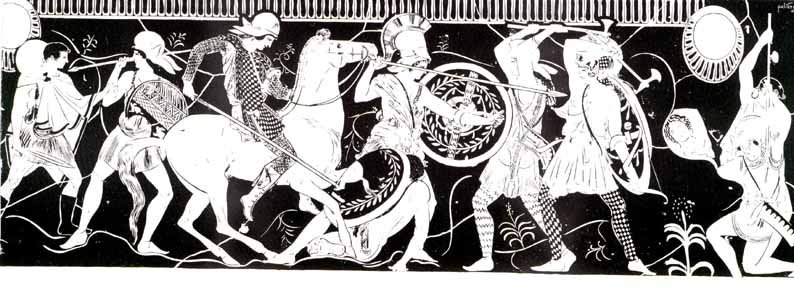
Battle scene of the Amazons
Painter of the Hairy Satyrs
Attic kratera from Numena
Metropolitan Museum of Art,
New York
Theseus either accompanied Heracles to Amazon country during the ninth labour of Heracles, or Theseus went to Themiscyra alone. Theseus either abducted Antiope, sister of Hippolyte or Hippolyta (the Amazon Queen) or she ran off with Theseus to Athens.
According to Nostoi (the "Returns") in the Epic Cycle, Heracles and Theseus were besieging Themiscyra. Antiope, who fell in love with Theseus, betrayed the Amazons and her city.
Theseus and Antiope married and had a son named Hippolytus.
The Amazons later attacked Athens but were defeated. Antiope fought by Theseus' side. In the final phase of the battle, Antiope was killed. (Some say Hippolyte was Theseus' wife.)
According to the event above, the Amazons invaded Athens to punish and kill Antiope for betraying them. While some writers say that the Amazons came to rescue Antiope, if Theseus had abducted Antiope.
According to Catalogues of Women, Theseus also married Hippe and Aegle at the same time.
Related Information
Name
Hippolyte or Hippolyta.
Antiope.
Sources
Oedipus at Colonus was written by Sophocles.
The Suppliant Women and the Madness of Heracles were written by Euripides.
Parallel Lives on Theseus was written by Plutarch.
Metamorphoses was written by Ovid.
Library and the Epitome were written by Apollodorus.
Description of Greece was written by Pausanias.
Library of History was written by Diodorus Siculus.
Related Articles
Oedipus, Seven Against Thebes, Heracles, Antiope, Hippolyte, Hippolytus.
Amazons. Cretan Bull (Marathonian Bull).
War of the Lapiths and the Centaurs
Peirithoüs
A king of the Lapiths. Peirithoüs (Peirithous) was the son of Ixion, Zeus or Aepytus, and of Dia, daughter of Eioneus or Deïoneus.
Peirithoüs was renowned more for his rash bravery than any heroic achievements. When he heard of Theseus' heroic exploits, Peirithoüs wanted to test him to see if it was true.
The young king stole a herd of cattle from Theseus' land. Theseus pursued him until Peirithoüs turned around to confront the Athenian hero.
Instead of fighting one another, they admired one another's courage. Theseus and Peirithoüs decided to become friends. It seemed that Theseus and Peirithoüs had become blood-brothers.
Some say that the two kings took part in the quest with Jason and the Argonauts, but Apollonius did not list their names in his version. According to Apollodorus, Theseus and Peirithoüs were in an adventure together in the Underworld. They definitely took part in the Calydonian boar hunt, where Theseus had to rescue his wounded friend.
Peirithoüs probably accompanied the hero to Amazon country. See the previous article on Amazons.
Related Information
Name
Peirithous, Pirithoüs, Peirithoos, Πειρίθοος.
Sources
The Iliad was written by Homer.
Shield of Heracles was possibly written by Hesiod.
Epitome was written by Apollodorus.
Metamorphoses was written by Ovid.
Fabulae was written by Hyginus.
Related Articles
Ixion.
Genealogy: House of Thessaly (Lapiths)
Wedding of Peirithoüs & Hippodameia
Peirithoüs (Peirithous) invited his friend to his wedding, to Hippodameia. Many other heroes attended, including Peleus and Nestor. Among the Lapith heroes were Polyphemus and Caeneus.
Polyphemus was the son of Eilatus and Hippea. Polyphemus had sailed with the Argonauts, but was abandoned with Heracles in Mysia when he went in search of Heracles' missing squire, Hylas. See the Argonauts about Hylas' disappearance.
Caeneus (Καινεύς) may have also been an Argonaut (he was not listed by the writer Apollonius). He was originally a daughter of Elatus (or Eilatus?) named Caenis. When Poseidon ravished Caenis, she was given a wish by the sea-god. Caenis wished to become a man so she would never be helpless again. Her wish was granted and Caenis was transformed into a man. She changed her name to Caeneus (Caineus).
As Caeneus, he became a hero of great strength and the transformation made his body invulnerable to all weapons. Caeneus had a son named Coronus, who would later be killed by Heracles.
Among the invited guests were the Centaurs. The Lapiths had recently made peace with Centaurs. The Centaurs lived near the Lapiths, mostly residing in the region of Magnesia. According to one version, the Lapiths and Centaurs were related. Lapithus and Centaurus were sons of Apollo and Stilbe, who was the daughter of the river-god Peneius and the Naiad Creüsa (Creusa). Lapithus became the ancestor of the Lapiths, while Centaurus was the ancestor of the Centaurs. In another version, Centaurus was the son of Ixion and the cloud phantom, possibly named Nephele, who resembled the goddess Hera. Centaurus copulated with some mares from Magnesia, which produced a tribe that were part man and part horse.
During the wedding ceremony, the Centaurs led by Eurytion became drunk and violent. Eurytion and the others tried to carry the bride and other Lapith women off, so they could rape them.
Fierce fighting broke out between the Centaurs and Lapiths. Theseus killed many Centaurs including Eurytion. (Another story says that Eurytion escaped to Arcadia, where the Centaur encountered Heracles in his fourth labour.)
The other guests, Peleus and Nestor, also took part in the battle. Caeneus also killed many Centaurs, until the Centaurs clubbed him to death with trees or buried him under the trees. The Lapiths drove away the rest of the Centaurs.
When the Lapiths dug out Caeneus' body, they found that Caeneus had been transformed back into a girl.
The Lapiths defeated the Centaurs and drove them out of Thessaly. The surviving Centaurs settled in Arcadia, where Heracles would meet them at Mount Pholoë (Mount Pholoe).
Peirithoüs and Hippodameia had a son named Polypoetes. Polypoetes and his friend Leonteus, son of Coronus and grandson of Caeneus, would later lead the Lapiths in forty ships to Troy from Argissa.
Related Information
Sources
Parallel Lives on Theseus was written by Plutarch.
The Iliad was written by Homer.
Shield of Heracles was possibly written by Hesiod.
Epitome was written by Apollodorus.
Metamorphoses was written by Ovid.
Fabulae was written by Hyginus.
Related Articles
Peleus, Nestor. Centaurs.
Genealogy: House of Thessaly (Lapiths)
Facts and Figures about the War of the Lapiths and the Centaurs.
Helen & Persephone
Theseus' last adventure with Peirithoüs (Peirithous) proved disastrous to the pair. Now in his middle age, Theseus started to lose all of his common sense because his younger friend's rashness started to influence the great hero. When Peirithoüs' wife died, they each probably decided or vowed to marry a daughter of Zeus.
Theseus wanted to marry the young Helen of Sparta, sister of the heroes Castor and Polydeuces, who were known as the Dioscuri, while Peirithoüs' ambition was even more rash and foolish since he wanted to marry none other than Queen of the Underworld herself, Persephone. Both decided to help the other to abduct his friend's intended wife.
When they abducted Helen, she was no more than a girl of twelve at the time. They left Helen with Theseus' mother Aethra in one of the towns in Attica. Some say Helen was mother of Iphigeneia by Theseus, but Clytemnestra, Helen's half-sister, brought up Iphigeneia as her own. (Usually Iphigeneia was considered to be the daughter of Agamemnon and Clytemnestra.)
The Dioscuri brought the Spartan army into Attica to rescue their sister. The Dioscuri were more than a match for Theseus. However, Theseus and Peirithoüs had already left for the Underworld. During Theseus' absence, the Dioscuri captured the town and rescued their sister while they held Aethra captive. Before they returned to Sparta, they put an Athenian named Menestheus (Μενεσθεύς) on the throne in Athens.
Persephone was the wife of Hades, Lord of the Underworld. Hades was clearly aware of their intention to abduct his wife. Hades was actually quite amused and did not have any intention of killing them since they were already in his domain.
Hades greeted Theseus and Peirithoüs outside his palace and invited the two mortals in. Hades asked them to sit in his presence. The moment they sat on the chairs, they could not move. They were fastened to the chairs. They did not know where they were or why they were there. In fact, they forgot everything, because they sat on the Chairs of Forgetfulness.
Theseus was only rescued because Heracles arrived to perform his last labour for his cousin Eurystheus, to fetch Cerberus from the Underworld. Heracles managed to pull Theseus free from the chair, losing some of his skin at the same time.
When Heracles tried to pull Peirithoüs out of the chair it caused an earthquake. They realised they could not release Peirithoüs without causing the Underworld to collapse. Besides, Hades knew that it was Peirithoüs who planned to abduct his wife.
Theseus accompanied Heracles back to the surface, only to find that Menestheus had usurped his throne and that the Dioscuri had taken his mother as a slave.
Related Information
Sources
Parallel Lives on Theseus was written by Plutarch.
Epitome was written by Apollodorus.
The Cypria from the Epic Cycle.
The Odyssey was written by Homer.
The Aeneid was written by Virgil.
Metamorphoses was written by Ovid.
Fabulae was written by Hyginus.
Related Articles
Later Life
Theseus was no longer a great hero, when he had killed Minotaur and fought against the Centaurs. Nor was he a king in Athens when he has been deposed by Menestheus. As Theseus grew older, he was living in exile and leading a far from successful life.
Hippolytus
Some years later, Theseus married Ariadne's sister Phaedra (Φαίδρα), the daugher of King Minos of Crete. The marriage was arranged by Theseus and Deucalion, son of Minos, who was king of Crete at the time. She bore him two sons: Acamas (Ἀκάμας) and Demophon (Δημοφών). Theseus sent his sons to Euboea when he lost his throne to Menestheus. In the Trojan War, his two sons later went to Troy under the leadership of Elephenor, king of Euboea.
Hippolytus (Ἱππόλυτος) was the son of Theseus by the Amazon Antiope (´Αντιοπη) or Hippolyta (). Theseus had sent his son to Troezen where the youth was brought up by his grandfather. Hippolytus was a hunter who worshipped the goddess Artemis and ignored the love-goddess Aphrodite. Hippolytus preferred to remain chaste, like the goddess he worshipped.
To punish Hippolytus for his neglect to honour her, Aphrodite caused Phaedra to fall madly in love with her stepson. At first, Phaedra tried to hide her feeling for her husband's son. But she could not hide her feeling from one of her loyal servants. She was slowly wasting away from longing.
The servant, trying to be helpful, urged her mistress to make her feeling known to Hippolytus. When Phaedra did try to seduce Hippolytus, he rebuked her, telling her that she was married and she belonged to Theseus. Stung by Hippolytus' rejection, she hanged herself.
Theseus found his wife dead. When he found a note from her, the letter stated and falsely accused Hippolytus of trying to rape her. In her shame, she committed suicide. Not knowing of his son's innocence, Theseus unjustly accused his son and banished Hippolytus from Troezen. Not satisfied after Hippolytus had left the city, he called upon Poseidon (his father) and laid a curse upon Hipploytus.
As Hippolytus drove his chariot along the road, Theseus' curse took effect; somehow Poseidon frightened Hippolytus' horses, causing him to crash his chariot. Hippolytus was mortally wounded.
At that moment, the goddess Artemis appeared to Theseus. Artemis told Theseus that the letter his wife had written was false. Hippolytus was not only innocent; it was Phaedra who tried to seduce his son.
Too late, Theseus realised to his horror that he had caused his son's death. Dying, Hippolytus returned home. He was not only innocent of what his father accused him of, he forgave Theseus. Artemis told Theseus that it was not entirely his fault, and that Aphrodite had plotted against his son. When Artemis disappeared, her favourite hunter died.
Some say that Hippolytus did not die, and that Artemis spirited him away. She had Asclepius heal him of his wound. Artemis made Hipploytus immortal, where he now lived in Italy. Hippolytus became a minor deity called Virbius in Italy.
I am not sure this event took place before or after Theseus' adventure into the underworld.
Related Information
Death of Theseus
Theseus retired to the court of Lycomedes (Λυκομήδης), king of the island of Scyrus, since the people had banished him from Athens. Menestheus was still ruler of Athens and he was one of the leaders who fought at Troy, because he was a former suitor of Helen of Sparta.
There are several versions of Theseus' death. But the most common was that his friend and host killed him by pushing him over the edge of a cliff. It seemed that Lycomedes murdered the aging hero, because of his plot with Menestheus.
Theseus was known as a hero who helped the helpless and poor: he was a great protector of the defenceless. The Athenians and Salamians worshipped him as a god.
Related Information
Sources
Epitome was written by Apollodorus.
Related Articles
Genealogy
Facts and Figures about the War of the Lapiths and the Centaurs
By Jimmy Joe
